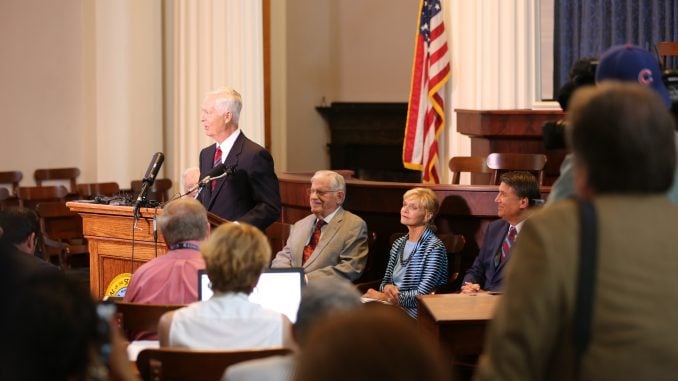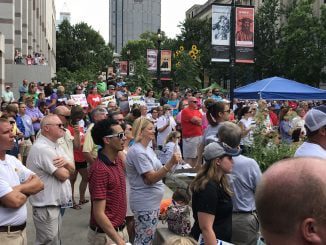
RALEIGH — On Monday at the old state Capitol House chambers in Raleigh, the state’s five living former governors gathered to oppose two proposed constitutional amendments from the state legislature. The measures, directed to go on November ballots statewide, take some appointment power from the executive branch and reassign it to the legislative branch.
“It’s really about whether a few politicians in the legislature want to increase their power at the expense of the people of North Carolina,” said former governor Jim Hunt, a Democrat.
Former Gov. Jim Martin, a Republican, organized the gathering which included Hunt, along with former Democrats and Govs. Mike Easley and Bev Purdue. Current Democratic Gov. Roy Cooper was not present, but his predecessor, Republican former Gov. Pat McCrory, joined the group of leaders in saying that the legislature’s amendments were a power grab.
“My advice to the hard-working legislators — and they are extremely hard-working for little pay — is that if you want to take on the responsibility of the governor, then have the courage to run for office and win. Earn it. Don’t highjack our state constitution,” said McCrory.
The General Assembly’s Senate Leader Phil Berger (R-Rockingham) and House Speaker Tim Moore (R-Cleveland) responded, “While it’s not surprising former governors oppose checks and balances on the unilateral authority of their office, we are confident the people will support a more accountable approach to filling judicial vacancies and approve a bipartisan balance on critical boards like the state’s ethics and elections commission over a system of purely political control.”
One of the amendments in question would put the power to appoint the State Board of Elections, among other boards, to the legislature. The other would change the way judicial vacancies are filled.
“They would impair the governor’s ability to appoint judges to fill vacancies in our courts by restricting his or her choices to just two, and those two would be elected by a partisan vote of the General Assembly,” said Martin. “How’s that for separation of powers.”
Easley said he was struck by how “poorly” the amendments were drafted. He said that they promised years of litigation, and that stripping the executive office of the power to appoint boards and commissions eliminates the ability to implement an executive agenda.
“Never have five of us gotten together and stuck it to you on the same issue,” said Easley. “So you can believe we believe in what we are saying to you.”
“My overriding concern is about the people of North Carolina. If these amendments were to pass, there will be one lawsuit after another and that would go on for a long time. … The state would be paralyzed,” he later added.
Purdue said that they did not make sense to her.
“These amendments don’t mean anything at all — I’ve read them,” she said. “I’m not a lawyer, but I think I can read legalese — but I can’t figure out what they are all about.”
Leadership at the North Carolina General Assembly said the intent of the proposed amendments was to move authority over some appointments to a branch more representative of the entire N.C. population, the legislature, returning its historic control over state government.
“At that time, we were called a ‘Rip Van Winkle state.’ North Carolina slept,” said Martin when a reporter mentioned the historic control of the legislature.
“That’s why the constitution was changed,” said Easley.
“We respectfully disagree with these governors that the people deserve no input on the filling of judicial vacancies, and that our state’s elections and ethics board should be a partisan controlled body despite its key role in our democratic process,” said Moore and Berger in a joint statement on Monday.
After the press conference, the five former governors huddled privately to discuss further options for fighting the amendments. Among the options on the table were fundraising efforts for a publicity campaign, led in part by political consultant Paul Shumaker, whom Martin said was present at the event.
A hearing is scheduled for Wednesday in a lawsuit over the amendments filed by Cooper. Republicans argue that voters should decide in November.



